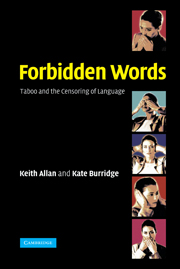Book contents
- Frontmatter
- Contents
- List of figures
- Acknowledgements
- 1 Taboos and their origins
- 2 Sweet talking and offensive language
- 3 Bad language? Jargon, slang, swearing and insult
- 4 The language of political correctness
- 5 Linguistic purism and verbal hygiene
- 6 Taboo, naming and addressing
- 7 Sex and bodily effluvia
- 8 Food and smell
- 9 Disease, death and killing
- 10 Taboo, censoring and the human brain
- Notes
- References
- Index
1 - Taboos and their origins
Published online by Cambridge University Press: 03 December 2009
- Frontmatter
- Contents
- List of figures
- Acknowledgements
- 1 Taboos and their origins
- 2 Sweet talking and offensive language
- 3 Bad language? Jargon, slang, swearing and insult
- 4 The language of political correctness
- 5 Linguistic purism and verbal hygiene
- 6 Taboo, naming and addressing
- 7 Sex and bodily effluvia
- 8 Food and smell
- 9 Disease, death and killing
- 10 Taboo, censoring and the human brain
- Notes
- References
- Index
Summary
This is a book about taboo and the way in which people censor the language that they speak and write. Taboo is a proscription of behaviour that affects everyday life. Taboos that we consider in the course of the book include
bodies and their effluvia (sweat, snot, faeces, menstrual fluid, etc.);
the organs and acts of sex, micturition and defecation;
diseases, death and killing (including hunting and fishing);
naming, addressing, touching and viewing persons and sacred beings, objects and places;
food gathering, preparation and consumption.
Taboos arise out of social constraints on the individual's behaviour where it can cause discomfort, harm or injury. People are at metaphysical risk when dealing with sacred persons, objects and places; they are at physical risk from powerful earthly persons, dangerous creatures and disease. A person's soul or bodily effluvia may put him/her at metaphysical, moral or physical risk, and may contaminate others; a social act may breach constraints on polite behaviour. Infractions of taboos can lead to illness or death, as well as to the lesser penalties of corporal punishment, incarceration, social ostracism or mere disapproval. Even an unintended contravention of taboo risks condemnation and censure; generally, people can and do avoid tabooed behaviour unless they intend to violate a taboo.
People constantly censor the language they use (we differentiate this from the institutionalized imposition of censorship). We examine politeness and impoliteness as they interact with orthophemism (straight talking), euphemism (sweet talking) and dysphemism (speaking offensively).
- Type
- Chapter
- Information
- Forbidden WordsTaboo and the Censoring of Language, pp. 1 - 28Publisher: Cambridge University PressPrint publication year: 2006



